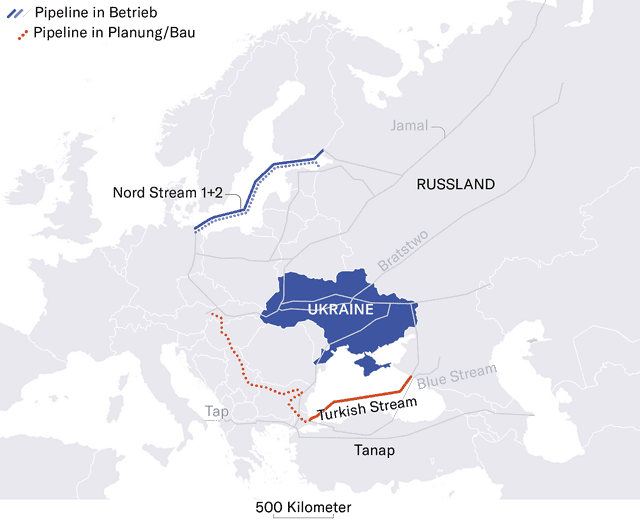During the visit of the Hungarian head of government, President Putin said the West was ignoring Russia’s security needs. Hungary, meanwhile, rejects the stationing of NATO soldiers on its own territory.
The conversation between Putin (far left) and Orban (far right) in the Kremlin lasted several hours.
Hungarian Prime Minister Viktor Orban revived a tradition with his visit to Moscow on Tuesday. He and Kremlin leader Vladimir Putin have met in person a dozen times since Orban returned to power almost twelve years ago. There was such a bilateral summit every year, most recently only interrupted by the pandemic, he said in his weekly radio interview last Friday.
In the midst of the crisis between the West and Moscow over the Russian troop deployment on the border with Ukraine, the timing is nevertheless a provocation – similar to Putin’s reception in Budapest in early 2015. At that time it was the president’s first visit to a NATO state since the illegal incorporation of Crimea.
Orban sees himself on a peace mission
Orban also tried in advance to allay concerns in the western capitals that the defense alliance did not appear united in its support for Kiev. As before any such negotiations, he coordinates with the allies, said Orban – on Monday, for example, through a telephone call with NATO Secretary General Jens Stoltenberg. He then spoke of Hungary as a reliable ally, the alliance was united.
Good call with PM Viktor Orbán of our staunch Ally #Hungary. In times of peace & crisis, we are united in #NATO. We call on #Russia to de-escalate & choose a peaceful path. While we remain prepared to deter Russia & defend all Allies, we continue to strive for dialogue.
— Jens Stoltenberg (@jensstoltenberg) January 31, 2022
The Hungarian government is currently repeating its position like a mantra: they want de-escalation and direct talks between the West and Russia. In the joint press conference after five hours of talks, Orban described his trip as a peace mission. Europe does not want a conflict between West and East. However, Putin made it clear that he considered the written responses from the US and NATO to the Russian demands to be inadequate. Moscow’s security concerns would be ignored. The President reiterated his demands that NATO refrain from expanding in the East, “retreat” to the position of 1997 and refrain from stationing missile systems near the Russian border.
Orban very vaguely offered the “Hungarian model” as a way out of the “complicated situation”: one is a member of NATO and the EU, but at the same time maintains close ties with Moscow. This requires mutual respect. He spoke out in favor of continuing the negotiations.
Orban is once again proving to be a tightrope walker trying to balance between the West and the close relationship with Russia. His Foreign Minister Peter Szijjarto told the pro-government newspaper Magyar Nemzet last week that nobody could ask Hungary to question its close ties with Moscow. In a television interview on Monday evening, Defense Minister Tibor Benko also rejected Washington’s desire to station around 1,000 American soldiers in Hungary as a deterrent. President Joe Biden announced last week that he would send troops to the NATO countries in Eastern Europe. 8,500 members of the army have already been put on alert. Hungary’s military is strong enough Benko now explained.
The talks also focused on energy policy, with Moscow taking out a billion-euro loan for the expansion of the Paks nuclear power plant in 2014 and a gas supply contract with Gazprom that came into effect last October. By 2036, 4.5 billion cubic meters of gas will flow through the Turkish Stream pipeline through south-eastern Europe to Hungary – bypassing the Ukraine. Orban would like to increase the volume by another billion. This is still being negotiated, he said on Tuesday.
This would make Hungary even more dependent on the Kremlin, which is not without risk for Orban. Two months before the parliamentary elections, the opposition, which is coming together for the first time, is trying to exploit its reputation as Moscow’s “Trojan horse” in the West. This is not insignificant in a country where the memory of the bloody suppression of the 1956 uprising by Soviet troops is cherished. On the other hand, inflation rose to over 7 percent last year and Orban has recognized that high prices could cloud his election prospects. Russian gas is the reason why energy costs in Hungary have risen significantly less than in Western European countries, he explained at the press conference.
However, Hungary’s reticence in the Ukraine crisis is not only due to its proximity to the Kremlin, but also to bilateral relations that have been miserable for years. The main point of conflict is how Kiev deals with the approximately 150,000 ethnic Hungarians who live in Transcarpathia in the far west of Ukraine. Budapest accuses the neighboring country of nationalism and discrimination, for example through an education law that restricts the teaching of minority languages. For this reason, Hungary has been blocking Ukraine’s stronger ties to NATO or the EU for years.
“Hungary can’t offer Ukraine much help”
Szijjarto told Magyar Nemzet last week that Hungary had unsuccessfully negotiated the situation with Ukraine. If Kiev does not change the way it deals with the minority, Budapest cannot offer much help in the conflict with Russia.
As much as Hungary emphasizes its loyalty to the alliance, the position towards Ukraine and the balancing act with Moscow represent a weakening of the western threat. NATO is only able to act if all 30 member states agree. Biden caused horror two weeks ago when he candidly addressed the shaky consensus, saying that if Russia’s attack on Ukraine is minor, there will likely be arguments about an appropriate response. He may not only have, but also alluded to Hungary.

